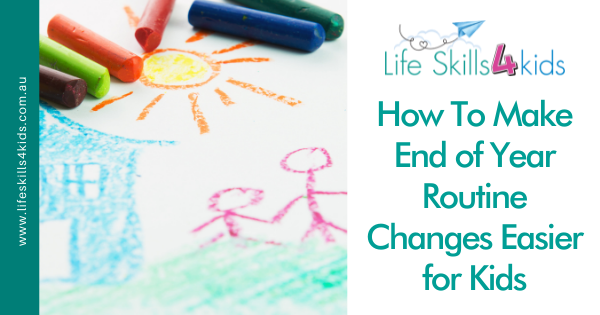End of Year At School
The end of the school year is fun, right?
Well, yes it is for some students, but for others relaxing the boundaries, feeling tired, facing unfamiliar routines and knowing that their class will be different next year is the stuff of nightmares.
As educators it is far too easy to assume that ALL of our students will enjoy the end of the year, when we traditionally relax our rules, do lots of ‘fun’ things and stop planning our days so carefully.
End of Year Challenges
Tests
Students often face tests or exams towards the end of their school year, which can cause high anxiety and stress. This anxiety can manifest itself in acting out, illness and an increased dread of going to school.
Practises and Rehearsals for ‘special’ Assemblies or Productions
It is very difficult to plan for the disruption of practises that seem to become all-consuming in schools at the end of the year. All educators want their students to perform to the best of their ability when they are being watched by parents, peers and ‘special’ guests (eg School Governors, local celebrities).
A performance can take weeks to plan, practise and rehearse for – this causes disruption to the school day and the lives of every student in the class.
‘Fun’ Days eg Sports Day, Movie Day, Days Out
All of these special days are supposed to be great fun for the kids and are usually designed as some sort of reward and celebration of the end of the school year for the students.
For some students though, they are anxiety-provoking, awful days that are as far from ‘fun’ as they can be.
Strategies for A Great End of Year
#1. Visual routine (class/individual)End of Year
- We all like to know what is happening in our lives and kids are no exception.
- There will be some students who will benefit from having a visual timetable of the day up at the front of the classroom. (I would recommend this begins as soon as you go ‘off-timetable’.)
- Anxious students or those who have extra needs will also benefit from having an individual daily timetable to help them make sense of their day.
- If you have students who need a lot of structure, it is a good idea to plan for this at the beginning of the year.
- To enable kids to cope with the unexpected, introduce a “Wow” or “Surprise” visual symbol throughout the year – so that they get used to the expect the unexpected whenever they see this symbol.
- For all students, it will help to have a weekly Newsletter that can be sent home with them on a Friday, so that the parents can then prepare them for the following week.
#2. Student Involvement In The ‘Fun’ Timetable
- Provide all students with choices whenever possible, so that they have maximum input in what they think is fun.
- There will be some students who prefer peace and quiet to a noisy party or movie. If you can, provide some options for students to choose from and allow them the freedom to create their own fun time.
#3. Adequate Transition
- Kids can become very stressed towards the end of the year because they know they will probably be moving classes, have different teachers or be moving schools.
- An adequate period of transition to allow students to explore their new environment, meet their new teachers and classmates and reassure themselves that they will be ok is vitally important.
#4. Maintain home schedule
- It is really tempting at this time of year to not only relax the rules and routine at school, but also do the same at home.
- Encourage parents to keep the home environment routines as normal as possible; explain that this helps their young people feel safe and secure, so that they will be able to face challenges more easily.
#5. Devise a plan to see friends over the holidays
- A lot of kids feel anxious about missing their friends when they are not at school.
- Before the kids leave school, encourage parents and students to make plans for getting together and keeping in contact with their friends.
- This can be especially problematic if the young person has a birthday in the holidays – there could be anxiety around nobody coming to the party – get your invites out before the kids break up if this is the case!
#6. Make a Seasonal Bucket List
- Both kids and adults can make a seasonal bucket list for the holidays.
- Agree that if it’s a realistic, each person will be able to do at least one thing from their top 3.
- Encourage all of the family and friends to look forward to the holiday.
#7. Mindful Meditation/Visualisation
- Introduce a short daily session of relaxation as a coping strategy. Dim the lights, encourage your students to close their eyes and relax as you do some simple deep breathing and visualisation exercises with them.
**Most importantly be kind and give everyone some extra understanding**
Students, teachers and parents all get tired and stressed at this time of year – remember to give everyone a bit of extra patience and love!

